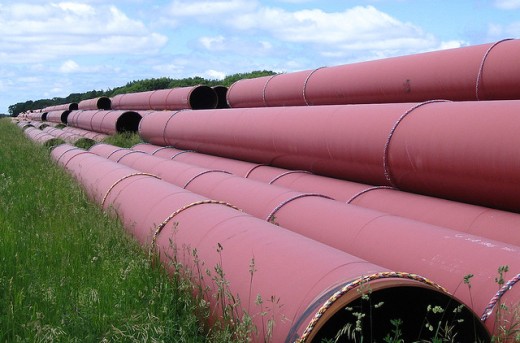
WASHINGTON (PAI)–Four U.S. construction unions — the Operating Engineers, Teamsters, Laborers and the Plumbers and Pipefitters — signed a Project Labor Agreement on Sept. 14 with a large Canadian energy company, to build a big trans-national oil pipeline from the oil sands of Alberta to the refineries of Texas’ Gulf Coast.
If approved by U.S. agencies and Democratic President Barack Obama, the $12 billion Keystone XL Pipeline, a project of TransCanada Corp., would employ more than 15,000 union construction workers from 2011-2013, officials at the signing ceremony said. The PLA would ensure a labor code and help set pay levels for the project.
The pipeline would also create at least 250,000 permanent jobs in 100-1,000 pumping stations, plus other spin-offs, along the way. And it would cut U.S. dependence on oil imported from sometimes-unfriendly nations, company and union leaders added.
The Canadian section of the pipeline is already complete enough, after several years of construction, that thousands of barrels of Canadian oil started flowing daily in July from Alberta to the Wood River refinery near Joliet, Ill., in the Chicago suburbs, and to a transshipment point in Oklahoma.
The PLA will cover the rest of the 36″ pipeline’s route stretching through Montana, South Dakota, Nebraska and Oklahoma to the refineries in Texas. It will carry 1.1 million barrels of oil daily — equal to half of daily U.S. oil imports from either the Middle East or Venezuela — and could expand to carry 1.5 million barrels. Its 1,900 miles and carrying capacity will both dwarf the famous Trans-Alaska pipeline.
Besides an estimated 250,000 permanent jobs after the pipeline is done, the project will “add more than $100 billion in annual total expenditures to the U.S. economy,” TransCanada said in announcing the signing ceremony, which took place at the AFL-CIO’s Building Trades Department. TransCanada also estimated pipeline construction “will generate more than $585 million in state and local taxes along the route and stimulate more than $20 billion in new spending for the U.S. economy.” A contractor alliance that works with unions also signed the PLA.
Union leaders at the signing emphasized the well-paying construction jobs the new pipeline would bring, at a time when joblessness among construction workers nationwide is close to 20% and when it is up to 30% for union construction workers. But they also said the pipeline is important because Canada is our reliable northern ally, unlike other oil producers.
“You hear every day that we gotta get less dependent on Middle East oil. This is the way to do it,” said Plumbers President William Hite. “If we don’t do this, they’ll take the oil to Vancouver, ship it to India or China for refining, and they’ll ship the refined products back to us at double the price.”
“This project will put 4,200 operators to work,” said Operating Engineers President Vincent Giblin, referring to his union’s contingent among the pipeline construction workers. “It couldn’t come at a better time.”
“We’re talking about 15,000 union members with good-paying living wage jobs, with health and welfare benefits — and at the end of this several hundred thousand permanent jobs,” added Laborers Vice President Terry Healy.
“We’re very excited about getting this going. We too have a lot of members sitting on the bench — and a lot who depend on oil,” said Teamsters Vice President Mike Manley.
Giblin also praised TransCanada for building the pipeline to and through the U.S., and with union labor, adding “all of us realize there were other alternatives they could have chosen.”
TransCanada CEO Russ Girling said the firm signed the PLA because of the past excellent track record it has had with U.S. construction unions and their allied contractors, in terms of getting projects done on time, safely and on budget.
Girling said pipelines are the safest and most environmentally responsible ways to ship oil, and contended his firm in particular goes the extra mile to ensure that. “That was the first question my board asked me” when they approved the PLA, he added.
The pipeline project still faces regulatory and political hurdles in the U.S., though not legislative ones. The State Department has initial oversight in such cases, and approved the pipeline through an environmental assessment. But 11 other agencies must sign off on the pipeline, even before it reaches Obama’s desk.
But environmentalists – including union members and family farmers – may be harder to convince.
“The Canadian oil sands have already been a lightning rod for everything bad” about oil. “Keystone XL has become that, too,” Girling said. Many say the oil sands are an ecological boondoggle.
But the unionists responded they would lobby the agencies and Obama for approval of the pipeline, which will translate into good union jobs. The pipeline does not need U.S. legislation, they added.
Girling said the “marketplace” has not let up in its demand for oil.
In other words, the nation is still addicted to oil.
Photo: Thousands of feet of pipes are stacked in a field southwest of Morden, Manitoba, waiting to be installed as part of the pipeline. (Loozrboy/CC )












Comments